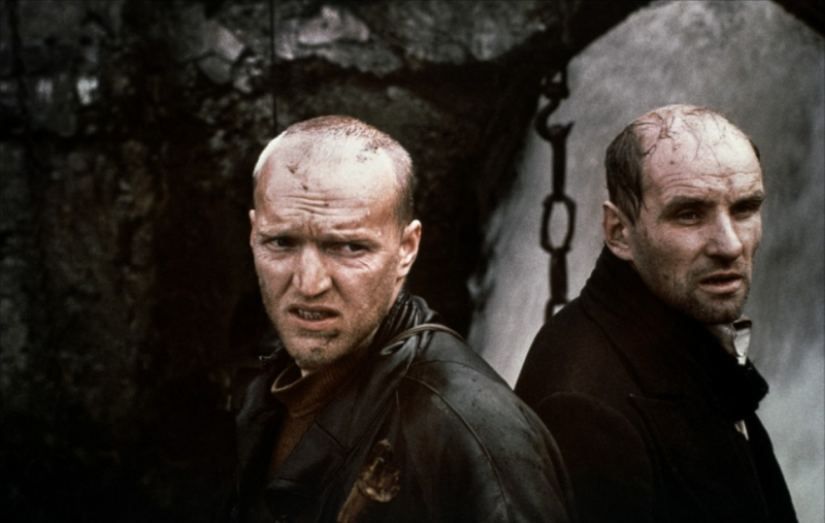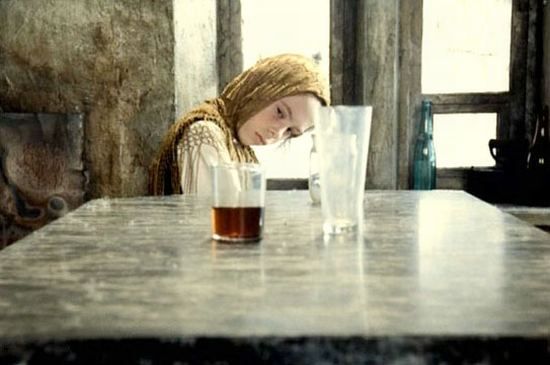← Back to Reviews
in
Stalker
(Andrei Tarkovsky, 1979)
(Starring: Alexander Kaidanovsky; Anatoly Solonitsyn; Nikolai Grinko)

As we get older, the magical tint of Disney fades, diminishing our childish sense of wonder, our idealism, and our optimistic belief that anything is possible, thus resulting in a pessimistic shift in our perspective of the world. It's like going to bed on Christmas Eve when you no longer believe in Santa Claus. Where's the magic? Where's the excitement? While watching Stalker, I experienced a similar shift in perspective. The mysterious power of the Zone held me within its grip and kept me enthralled until, like the characters in the film, I began to lose hope. Doubts persisted and grew until I no longer believed in the magic of the Zone. I scoffed at Stalker's claims of hidden dangers. I laughed at the notion that this room, located deep within the decaying remains of a wet and mildewed industrial building, could contain the power to grant a person's innermost desires. It's all in Stalker's head, I thought. The Zone is just a metaphor, a symbol, and although that might make the subject ripe for analysis, it's much less exciting within the confines of the film.
When the characters venture into a room filled with sand dunes, we see a bird fly halfway across the room, only to disappear into thin air. Then another bird (or is it the same bird reappearing from a different angle?) flies across the room and lands safely on the other side. Is this a trick of the camera? Or is it proof that the normal laws of physics no longer apply inside the Zone? Just like a kid, on Christmas Eve, convinces himself that the sounds on the roof are only tree branches scratching against the shingles, not Santa Claus and his sleigh of reindeer, I shrugged it off as a strange coincidence. The final scene of the film, however, leaves no doubt. What first seemed like a science-fiction film only because of the questions it asks, not because of its content or its execution, is flipped on its head with one gut-punch of an ending. Suddenly, an array of extraordinary possibilities is revealed, and my hope and faith in the mysterious power of the Zone and in the world of Stalker was renewed.

Stalker is brilliantly shot, with a great eye for detail and an almost Kubrick-like composition. Every frame of the movie, with its dirt and grime and rain-drenched settings, is like a grotesque painting of malnourished beauty. The world outside the Zone is filmed through an oppressively thick sepia filter, as if the entire world, with its apocalyptic, Chernobyl-like aesthetic, has rusted into decay. This makes the Zone, with its blue sky and fields of green, almost heavenly by comparison. Or at least it feels that way until the characters travel deeper into themselves and into the Zone, where the grime and slime accumulates on their skin, and the grass and clouds give way to subterranean tunnels of crumbling concrete and debris. It's no coincidence that the sepia filter returns just as the characters sit hopeless and defeated outside their destination. And it's also no coincidence that Stalker's handicapped daughter is the only aspect of the outside world viewed through color, as her special gifts hint at the hope of a brighter future.
Stalker, just like the mysterious realm inside the Zone, is loaded with ambiguity, asking more questions than it answers. This will turn some off some viewers, but, in my opinion, any work of art that asks important questions can be much more powerful and hard-hitting than a work of art that pretends to have all the answers. After all, what's more important, the belief in something or the proof? Does it matter if the room inside the Zone really exists or is it only the idea of the room that matters? Must the room really grant people's wishes for them to have hope in a brighter tomorrow? Or is it only the symbolic nature of such a room that serves as a catalyst for change?
Like the works of fellow Russians Tolstoy and Dostoevsky, Tarkovsky's films are dense, stuffed with meaning and rife with symbolism. They can't be fully digested with one viewing, so I feel at a loss to try to write a review for this film when I've only just watched it for the first time. Stalker is a Master's thesis of a film, one that deserves to be watched multiple times and analyzed and dissected and written about at length. This is a long movie, divided into two parts, and, with its slow, meditative pace, you can certainly feel the movie's length. But regardless of its difficult nature, Stalker is an absolutely awe-inspiring, thought-provoking work of art, frustrating at times, but hugely rewarding. I can't wait to watch it again.

(Andrei Tarkovsky, 1979)
(Starring: Alexander Kaidanovsky; Anatoly Solonitsyn; Nikolai Grinko)

As we get older, the magical tint of Disney fades, diminishing our childish sense of wonder, our idealism, and our optimistic belief that anything is possible, thus resulting in a pessimistic shift in our perspective of the world. It's like going to bed on Christmas Eve when you no longer believe in Santa Claus. Where's the magic? Where's the excitement? While watching Stalker, I experienced a similar shift in perspective. The mysterious power of the Zone held me within its grip and kept me enthralled until, like the characters in the film, I began to lose hope. Doubts persisted and grew until I no longer believed in the magic of the Zone. I scoffed at Stalker's claims of hidden dangers. I laughed at the notion that this room, located deep within the decaying remains of a wet and mildewed industrial building, could contain the power to grant a person's innermost desires. It's all in Stalker's head, I thought. The Zone is just a metaphor, a symbol, and although that might make the subject ripe for analysis, it's much less exciting within the confines of the film.
When the characters venture into a room filled with sand dunes, we see a bird fly halfway across the room, only to disappear into thin air. Then another bird (or is it the same bird reappearing from a different angle?) flies across the room and lands safely on the other side. Is this a trick of the camera? Or is it proof that the normal laws of physics no longer apply inside the Zone? Just like a kid, on Christmas Eve, convinces himself that the sounds on the roof are only tree branches scratching against the shingles, not Santa Claus and his sleigh of reindeer, I shrugged it off as a strange coincidence. The final scene of the film, however, leaves no doubt. What first seemed like a science-fiction film only because of the questions it asks, not because of its content or its execution, is flipped on its head with one gut-punch of an ending. Suddenly, an array of extraordinary possibilities is revealed, and my hope and faith in the mysterious power of the Zone and in the world of Stalker was renewed.

Stalker is brilliantly shot, with a great eye for detail and an almost Kubrick-like composition. Every frame of the movie, with its dirt and grime and rain-drenched settings, is like a grotesque painting of malnourished beauty. The world outside the Zone is filmed through an oppressively thick sepia filter, as if the entire world, with its apocalyptic, Chernobyl-like aesthetic, has rusted into decay. This makes the Zone, with its blue sky and fields of green, almost heavenly by comparison. Or at least it feels that way until the characters travel deeper into themselves and into the Zone, where the grime and slime accumulates on their skin, and the grass and clouds give way to subterranean tunnels of crumbling concrete and debris. It's no coincidence that the sepia filter returns just as the characters sit hopeless and defeated outside their destination. And it's also no coincidence that Stalker's handicapped daughter is the only aspect of the outside world viewed through color, as her special gifts hint at the hope of a brighter future.
Stalker, just like the mysterious realm inside the Zone, is loaded with ambiguity, asking more questions than it answers. This will turn some off some viewers, but, in my opinion, any work of art that asks important questions can be much more powerful and hard-hitting than a work of art that pretends to have all the answers. After all, what's more important, the belief in something or the proof? Does it matter if the room inside the Zone really exists or is it only the idea of the room that matters? Must the room really grant people's wishes for them to have hope in a brighter tomorrow? Or is it only the symbolic nature of such a room that serves as a catalyst for change?
Like the works of fellow Russians Tolstoy and Dostoevsky, Tarkovsky's films are dense, stuffed with meaning and rife with symbolism. They can't be fully digested with one viewing, so I feel at a loss to try to write a review for this film when I've only just watched it for the first time. Stalker is a Master's thesis of a film, one that deserves to be watched multiple times and analyzed and dissected and written about at length. This is a long movie, divided into two parts, and, with its slow, meditative pace, you can certainly feel the movie's length. But regardless of its difficult nature, Stalker is an absolutely awe-inspiring, thought-provoking work of art, frustrating at times, but hugely rewarding. I can't wait to watch it again.

